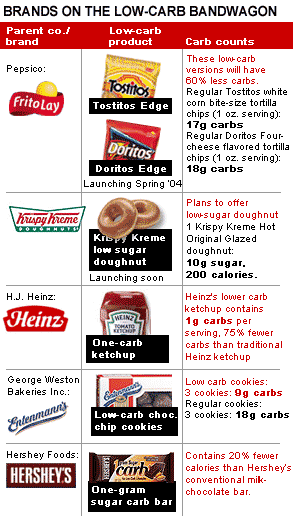NEW YORK (CNN/Money) -
Foodmakers keep it coming: Low-carb Doritos, low-carb Entenmann's chocolate chip cookies, Heinz' 'One Carb' ketchup, a low-sugar Krispy Kreme Doughnut.
But industry watchers have a warning for companies swayed by the "Atkins friendly" hype -- this is just a fad that will fizzle away in a couple of months. Stay committed to your fatty and sugary products. They taste better, consumers already like them.
"Keep innovating, but don't ignore your core business," said Sam Rovit, a food services consultant with Chicago-based firm Bain &Co. "Companies are coming out with all these low-carb products because they're being responsive to consumer demand for the diet du jour. At the same time, they're trying to boost growth in a mature [packaged foods] market that's already experiencing low-single-digit growth."

"But you have to be cautious. The astonishing thing about this low-carb craze is the significant number of people who've tried it and then gone back to their earlier eating habits," Rovit added. "That's why what I'd say to the pizza chains is, 'Hang in there. People will be eating deep-dish pizzas soon."
Indeed, food companies have been clamoring to take advantage of the explosive popularity of the low-carb diet promoted by the late Dr. Robert Atkins. According to market research firm ACNielsen, more than 17 percent of U.S. households include someone who is currently on a low-carbohydrate diet.
More importantly, and to Rovit's point, a slightly higher number -- 19.2 percent -- reported someone in their household was once on a low-carb diet, but is no longer.
"The low-carb diet craze is having a significant impact on how people eat. However, the number of people who have tried a low-carb diet and are no longer on it is compelling as well," Todd Hale, ACNielsen analyst and senior vice president, wrote in a report. "The jury is still out as to whether the low-carb diet has staying power."
The countdown has begun
Nutritionist Charles Platkin says the low-carb food fever is a "food deja vu" that smells a lot like the "low-fat" craze in the early 1990s.
Said Platkin, "Didn't we go through this already? Here we go again. Restaurants are adding low-carb menus. Food manufacturers like Unilever introduced a whole low-carb line of products. Pepsi Foods has also made a quick turnaround over the last 12 months and has joined the club."
His verdict: It's a mistake.
Platkin says that while a balanced low-carb diet with vegetables may help to control or reduce weight, low-carb snacks, beverages, chocolates, doughnuts, may not. "It's a Catch 22 for consumers. A low-carb alternative isn't always a calorie bargain."
"I think this low-carb trend in processed food is misguided and more of a hype issue. I expect it will last maybe just another 14 to 16 months," he said.
Not so, said Dr. Stewart Trager, with the Atkins Physicians Council.
"The fundamental difference between the low-fat diet and the Atkins diet is that people have discovered the Atkins diet and its benefits on their own and have chosen to follow it. It was not prescribed by the medical profession," Trager said. "As more people see its impact, its following will continue to grow."
Sin over salvation
Burt Flickinger, a consultant with the Strategic Resources Group, disagrees with Trager. He thinks that when it comes to their eating habits, consumers will continue to choose the proverbial sin over salvation -- or fat and sugar -- over the lack of it.
"Americans are work-stressed, time-stressed, and they're eating out more. Sugar and fat is tasty and it gives immediate gratification," said Burt Flickinger, a consultant with the Strategic Resources Group in New York.
Food companies are smart, and recognize this fact.
YOUR E-MAIL ALERTS
|
Follow the news that matters to you. Create your own alert to be notified on topics you're interested in.
Or, visit Popular Alerts for suggestions.
|
|
|
 |
"We have our share of the high-calorie indulgent products and they will always be popular because people don't want to diet 24/7," General Mills CEO Stephen Sanger, told analysts at a food industry conference last month. "My point is we have lots of brands that can play an important role in a balanced weight regimen."
Even though the company, which makes Cheerios cereal and Pillsbury chocolate-chip cookies, said the low-carb trend has hurt sales of some products, it's currently developing a doughnut -- and it's not low-carb -- for one of its customers.
Meanwhile, Hershey Foods announced earlier this year it would develop a line of nutrition bars in partnership with Dr. Barry Sears, who developed the carb-tolerant Zone Diet.
Said Flickinger, "Food manufacturers will capitalize on fads as long as they're around and its profitable for them. When it's over, it's on to the next thing."

|

